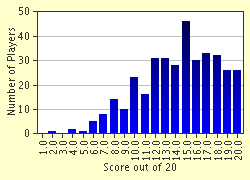Quiz Answer Key and Fun Facts
1. England's first Civil War occurred between 1139 and 1153. One of the belligerents was King Stephen. Who, as a child of Henry I, claimed the throne?
2. William, Henry I's only legitimate son, perished in 1120. How did he die?
3. When Henry I died, the best claim to the throne was held by the grandson of William the Conqueror and the son of Henry's older brother. Who was that individual?
4. Matilda was the widow of the German Emperor Henry V. When William, son of Henry I, perished, she was ordered home and a second marriage was arranged. Who was her second husband?
5. Upon what relationship did Stephen base his claim to the crown?
6. One of the staunchest of Matilda's supporters was her illegitimate half brother. Who was he?
7. Ellis Peters, a modern novelist, has set one of her mystery series during this period of time in the abbey of St Peter and St Paul at Shrewsbury. Who is her detective?
8. London consistently supported Matilda during the Anarachy (civil war).
9. After the Battle of Lincoln in 1141, Stephen was captured by Robert of Gloucester.
10. Geoffrey of Anjou, Matilda's husband, played a decisive part in the campaign in England.
11. Matilda's marriage to Geoffrey was a happy one.
12. In 1141, the rout of Winchester provided the same opportunities for the forces under the imprisoned Stephen as the Battle of Lincoln had provided for the forces of Matilda. As a result of this defeat, Stephen was released from his prison at Bristol in return for the release of which prisoner captured by the forces of Stephen?
13. Henry, Bishop of Winchester, was the brother of King Stephen and a consistent supporter of his in the struggle.
14. In 1147 Matilda lost one her staunchest supporters with the death of her half brother Robert of Gloucester. She retired to Normandy. Her supporters in England requested support from her husband Geoffrey of Anjoy, hoping for money. Instead they got his son Henry. Stephen also had an asset in his son who he hoped would follow him to the throne. Who was this son?
15. In 1153 a truce was arranged and terms of settlement were negotiated. It is reported that Stephen's elder son was furious at these terms and stormed off in anger. What was the key term of the settlement?
16. Stephen was a weak king. What was the result?
17. Unlike other wars where combat was largely limited to pitched battles, this civil war was one of depredation.
18. According to the Anglo-Saxon Chronicle, which of these actions became commonplace on the part of the powerful nobility?
19. During this time, the nobility changed sides frequently, sometimes favouring Matilda, sometimes Stephen, whichever side was prepared to 'outbid' the other for their support. As a result, no centralized government was able to control lawlessness.
20. The havoc of this period had major repercussions during the following reigns.
Source: Author
tripeuro
This quiz was reviewed by FunTrivia editor
bloomsby before going online.
Any errors found in FunTrivia content are routinely corrected through our feedback system.

